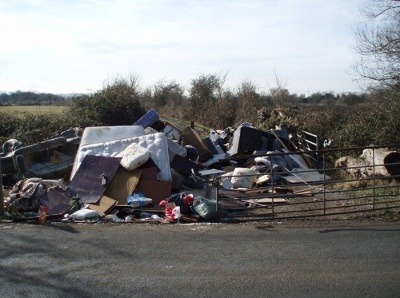Government waste crime review to tackle ‘serious and organised’ crime
 Serious and organised crime has long dogged the waste sector in England, and the government is now launching a review to examine how best to tackle this ever-growing problem.
Serious and organised crime has long dogged the waste sector in England, and the government is now launching a review to examine how best to tackle this ever-growing problem.
Launched yesterday (10 June) by Environment Secretary Michael Gove, the review will look into the types of crimes being committed, the impacts of these crimes and how enforcement agencies might best respond to them.
Gove said: “Organised criminals running illegal waste dumps and fly-tipping are blighting local communities. They cost our economy vast amounts of money, pollute our environment and harm our wildlife. We must crack down on these criminals who have no regard for the impact they have on people’s lives. The time is right for us to look at how we can best tackle these antisocial and inexcusable crimes”.
Serious and organised waste crime refers to ‘the planning, coordinating and committing [of] serious offences, whether individually, in groups or as part of transnational networks’. Types of offence could include anything from fly-tipping to illegally burning waste, illegally exporting waste or operating a site without the proper permits, but this review refers specifically to larger-scale organised crimes, with a Home Office study suggesting that criminals may be targeting waste management activities as a cover for other serious crimes such as human trafficking, fraud, money laundering and the supply of drugs and firearms.
Read more: Hidden chains – modern slavery in the waste and resources sector
In 2016/17, the Environment Agency (EA) discovered more than 850 new illegal waste sites; in England alone, waste crime costs over £600 million to taxpayers and the wider economy. In addition, councils in England spent £50 million clearing up fly-tipping sites in 2015/16, and recorded an increase in incidences of fly-tipping from the previous year. A recent study revealed that the Central London authority of The City of London has the worst levels of fly-tipping in the country, with 238 incidents per 1,000 people.
The Environment Services Association (ESA) published a report in May 2017 blaming ‘weak regulation’ for the problem, with ESA Executive Director Jacob Hayler describing it as “far too easy” for criminals to get into the industry.
Commenting on Gove’s announcement, ESA’s Head of Regulation Sam Corp said: “ESA very much welcomes this review into organised waste crime. The review helpfully considers a number of aspects previously explored in ESA’s ‘Rethinking Waste Crime’ report published last year, such as the extent and nature and impact of waste crime, as well as putting forward recommendations to tackle this serious threat to both the environment and to legitimate business.
“The review rightly highlights the importance of effective intelligence and information sharing, and the importance of collaboration to tackle the threat of waste crime. We welcome this focus as we are already working closely with the EA on improving the flow of information relating to suspect waste criminal activities and under the remit of the EA/ESA Accord agreed last year. We also hope that this aspect can be a key focus of the ‘Right Waste, Right Place’ campaign to raise awareness of the waste ‘duty of care’ in the coming months.
“We look forward to inputting into this review and to informing the government’s strategic approach to waste crime expected in the forthcoming Waste Strategy.”
Work in progress

The new review will directly inform the development of a new strategic approach to waste crime and criminals in the England, to be published as part of the upcoming Resources and Waste Strategy, containing ‘actionable recommendations’ to tackle the problem. As part of the review, the government is launching a call for evidence, inviting responses from groups and individuals on the following topics:
- The extent and nature of crimes being committed;
- Characteristics of organised crime groups involved;
- Examples of environmental, community and economic impacts;
- Examples of where response to the threat is working well, or less well;
- Views on EA, police, National Crime Agency and local government responses; and
- Suggested improvements to prevention and law enforcement.
A previous consultation, which concluded on 26 March, asked for responses on how to reduce crime at waste-handling sites and introducing fixed penalties on householder duty of care (the responsibility of householders to ensure their waste is going to properly registered destinations). The evidence gathered in this consultation has yet to be released.
EA Chief Executive Sir James Bevan, who in 2016 described waste crime as “the new narcotics”, commented on the new review, stating: "We welcome the opportunity to review how best we deploy our resources and strengthen ties across government, and with the police, to target organised criminal rings behind illegal waste operations, and bring perpetrators to justice."
The review will be supported by a cross-sector advisory panel which includes Julia Mulligan (North Yorkshire Police and Crime Commissioner), Craig Naylor (Deputy Chief Constable, Lincolnshire Police) and Dr Colin Church, Chief Executive of the Chartered Institute of Wastes Management (CIWM). Church said: “The threat posed by serious and organised crime in the waste sector is significant and growing. It undermines the legitimate resources and waste industry, blights communities, and costs society and the taxpayer.
“By its very nature, serious and organised crime often takes place out of plain sight. This means that intelligence gathering and sharing, as well as collaborative working and the pooling of resources between the various law enforcement agencies, is essential. The government and the sector have already been working closely together to tackle this scourge and this review will put forward recommendations to help develop even smarter and more effective frameworks to deal with this problem.”
The call for evidence on serious and organised waste crime will run until 8 July 2018, and responses can be submitted on the government website. 







